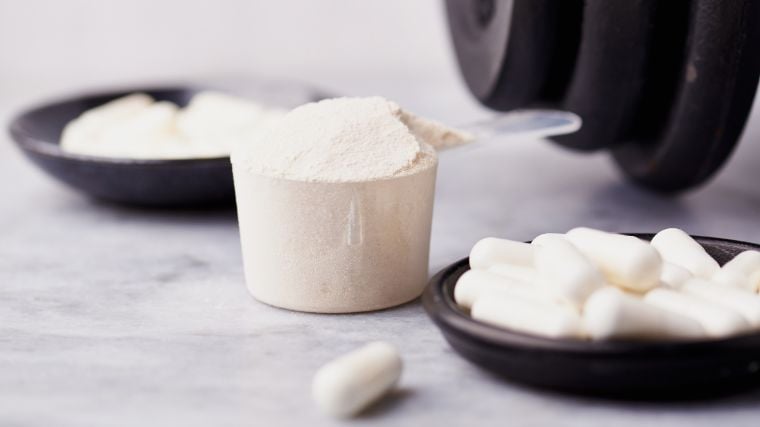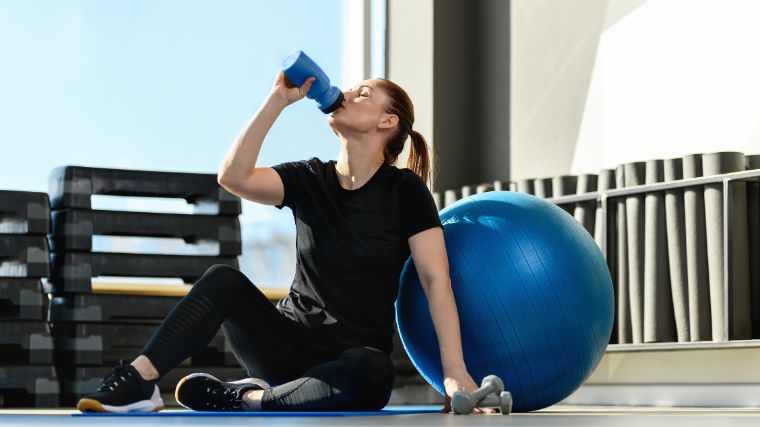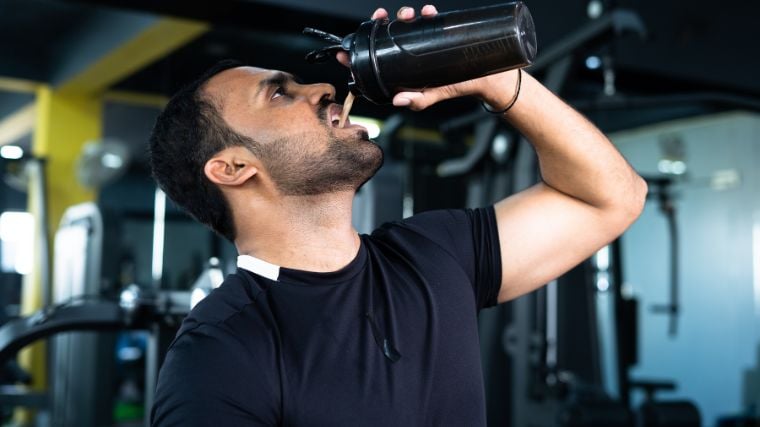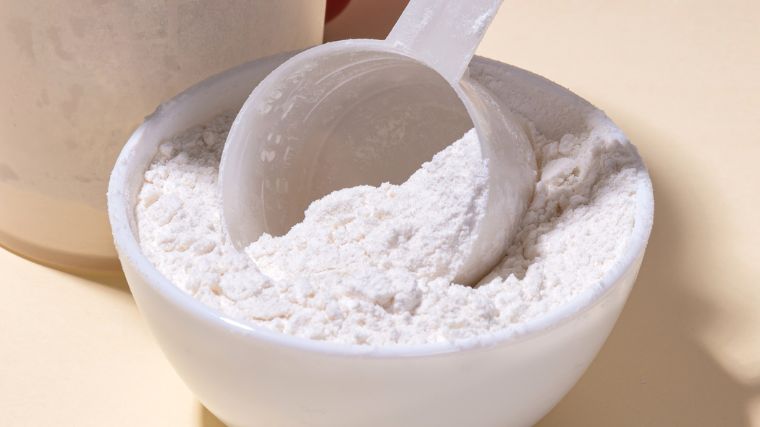When you’re on top of your training and nutrition, you know that pre- and post-workout nutrient timing is key. Hitting your macros throughout the day is important—but you’re likely also intentional about fueling up to train and grabbing something (like a shake made with the best whey protein powder) after your session to start the recovery process and repair your muscles.
If you’re hoping to take your gains to the next level or break through a strength training plateau, you may have also reached for a pre-workout supplement. Pre-workouts are generally a mix of caffeine, amino acids, and vitamins that are meant to give you feelings of increased energy and focus. Many gym-goers take it to boost their endurance and improve athletic performance.

Just like the name says, you take pre-workout before your workout. But how long does pre-workout last? Pre-workout can be made of different substances, and they have different half-lives.
Let’s take a look at the most common ingredients in pre-workout and how long they last so you know how much time you have to train after you sip.
Editor’s Note: The content on BarBend is meant to be informative in nature, but it should not be taken as medical advice. When starting a new training regimen and/or diet, it is always a good idea to consult with a trusted medical professional. We are not a medical resource. The opinions and articles on this site are not intended for use as diagnosis, prevention, and/or treatment of health problems. They are not substitutes for consulting a qualified medical professional.
- What Is Pre-Workout?
- How Long Does Pre-Workout Last?
- Common Pre-Workout Ingredients
- Benefits of Pre-Workout
- Side Effects of Pre-Workout
- Frequently Asked Questions
What Is Pre-Workout?
Pre-workout is a dietary supplement made up primarily of caffeine, amino acids, and vitamins you ingest before training. It’s meant to give you an energy boost to help improve your exercise performance. Pre-workout products can come in powder, liquid, capsule, and gummy form. The popular powder form is typically mixed with water into a convenient pre-workout drink.
Since pre-workout can feature different ingredients, it is not a standardized product, and scientific research on its effectiveness is still being studied. However, pre-workout supplements have been popular since the ’90s in the bodybuilding community. People who are serious about training continue to buy them. In 2019, the global pre-workout market was valued at $12.6 billion by Grand View Research. (1)
How Long Does Pre-Workout Last?
How much time do you have to get to the gym and train after you take pre-workout? The bottom line is about two hours—here’s how it breaks down.
There are two periods of time to look at: the time it takes for the pre-workout to kick in after ingestion and the half-life of the ingredients. Half-life refers to how long it takes for half of the original dose of the substance to leave your system. (2) With pre-workout ingredients, you may be able to feel the height of the purported effects during the half-life.

[Read More: Nutrition for Athletes — How to Eat for Muscle and Performance]
Two of the most common ingredients in pre-workout are caffeine and l-arginine. There is specific information on the onset and half-lives of these substances, and judging by these periods of time can give you an idea of how long pre-workout will last.
It can take 60 to 90 minutes for pre-workout containing caffeine and arginine to reach its highest effects. Arginine may leave your system within 120 minutes, but caffeine can last up to seven hours. (3)(4)(5)
Caffeine
If you’ve ever had a cup of coffee, you’re familiar with the effects of caffeine, though there may be more caffeine in your pre-workout. It can take up to 60 minutes to feel the maximum effects of caffeine, and caffeine has a half-life of three to seven hours in most adults. (3) So, while you may feel the height of your caffeine buzz after an hour, it stays in your system longer.
Arginine
Arginine is a non-essential amino acid that serves as a precursor to nitric oxide. It’s common in pre-workout formulas because nitric oxide enhances blood flow which may help deliver more oxygen and nutrients to your muscles. This may also lead to better muscle contractions during exercise. The strongest effects of arginine can take 60 to 90 minutes to kick in after ingestion. (4)
The half-life of arginine has been shown to be anywhere from 30 minutes to two hours, but it depends on the dosage amount and the individual’s body. (5)
Other Ingredients
There are other common ingredients in pre-workout, but more research is needed on the exact periods of time they may last for. Two hours seems to be the maximum amount of time you may feel arginine and caffeine together in your system—though caffeine can last up to seven hours. Two hours is how long the height of the effects will last, but caffeine and other ingredients in pre-workout may still stay in your system for longer.

[Read More: 5 At-Home Workouts for Strength, Muscle Growth, Power, and More]
It should be noted that substances affect individuals differently, and there is not a concrete time that pre-workout will last for everyone. It may depend on the serving size, the amount of each ingredient, your body weight, the type of exercise you’re doing, and your general sensitivity to or tolerance of the ingredients.
Common Pre-Workout Ingredients
Different formulations of pre-workout contain different ingredients. The most common ingredients in multi-ingredient pre-workout supplements (MIPS) were found to be beta-alanine, caffeine, citrulline, tyrosine, taurine, and creatine. Many pre-workouts also contain arginine, BCAAs, and other vitamins. (6)
L-citrulline is a precursor for L-arginine, and arginine is a precursor to nitric oxide production, which widens blood vessels and increases blood flow. (7) Citrulline malate and arginine are both non-essential amino acids.
Beta-alanine is a precursor to carnosine. Both are amino acids that may help reduce lactic acid and delay fatigue. (8)(9)
Caffeine is a stimulant that affects your nervous system. If you have a stim-based pre-workout, it likely has caffeine. Caffeine may delay fatigue and improve your focus and cognition during exercise. (9)(10)
Tyrosine is a non-essential amino acid associated with releasing dopamine and adrenaline. It may improve your focus and performance during high-stress situations—including resistance training. Research on tyrosine supplements is mixed, but it’s been shown to potentially reduce stress when exercising in the heat and boost cognition with a lack of sleep. (11)(12)
Taurine is an essential amino acid that may function as an antioxidant in your body. It’s thought to reduce oxidative stress which may increase your endurance during resistance exercise. (9)
[Read More: The Definitive Guide to Bodybuilding Meal Prep]
Creatine is an amino acid and one of the most well-researched supplements for boosting athletic performance. It plays a role in energy production and can increase your ATP stores for better muscular contractions during high-intensity weightlifting. Creatine benefits may also play a role in muscle protein synthesis, which leads to muscle growth. (13)
BCAAs stands for branched-chain amino acids. These are essential amino acids needed for muscle protein synthesis to occur along with resistance training. They can aid in recovery and building muscle mass. Aside from the best BCAA supplements, you can also get your BCAAs by consuming complete protein sources, and they’re often present in pre-workout supplements as well. (14)
The most common active ingredients to look for in pre-workout supplements:
- Arginine
- Beta-Alanine
- BCAAs (Branched-Chain Amino Acids)
- Caffeine
- Citrulline Malate
- Creatine
- Taurosine
- Tyrosine
- Other vitamins
Benefits of Pre-Workout
After you take pre-workout, you may have up to roughly two hours to reap the benefits during your training session. When combined, the different substances in pre-workout are meant to supply you with more energy and focus so you can put in quality reps and potentially train a little bit harder. Let’s break down the potential performance-enhancing effects of a pre-workout supplement.
May Help Increase Energy Levels
Caffeine and other stimulants may give you an increased feeling of energy to power through your workout, as studies on the effects of pre-workout are measured by self-reported subjective experiences. People taking a multi-ingredient pre-workout supplement containing caffeine reported increased feelings of energy, focus, and alertness. (9)
When you ingest caffeine, it stimulates your central nervous system (CNS) and blocks adenosine binding. Adenosine can make you feel tired, and caffeine blocking it may decrease your feeling of tiredness. (15) A study on the effect of caffeine on resistance training showed that participants had a reduced rate of perceived exertion (RPE). (16)

[Read More: The Best Online Workout Programs For Coaching, Cardio, Value, And More]
More feelings of energy and a lower RPE could lead you to potentially push a bit harder in the gym or extend your sessions with increased endurance.
May Help Boost Mental Focus
Self-reported effects of pre-workout supplements include a greater feeling of mental focus. (9) Stimulants in pre-workout may help boost your focus but so can tyrosine, creatine, and nitric oxide.
Tyrosine may decrease feelings of stress and release dopamine and adrenaline, potentially leaving you more clear-headed to focus on your form and your performance. (11)
Creatine and nitric oxide affect your brain and may have cognitive benefits. (17) Having both in your system may also boost your cognition for better focus. (7)(13)
May Help Increase Blood Flow
When you have citrulline malate and arginine in your pre-workout, you can boost your body’s supply of nitric oxide. Nitric oxide is also boosted by nitrates—some pre-workouts include beetroot juice for this reason. (18) Dietary nitrates in pre-workout have been shown to potentially improve performance in endurance and high-intensity exercise. (9)
Nitric oxide increases vasodilation (blood flow) by relaxing and widening your blood vessels. Increased blood flow allows more nutrients and oxygen to be delivered to your muscles while you train. It also helps relax and dilate your muscles which studies suggest may benefit performance, hypertrophy, and training adaptations. (7)
[Read More: The Best Ashwagandha Supplements For Sleep, Testosterone, And More]
Some studies show that nitric oxide can also benefit cardio workouts by lowering your blood pressure and thus boosting your performance in long-duration activities like walking, running, and cycling. (19)(20)
May Delay Muscle Fatigue
Citrulline malate, arginine, and beet powders have been shown to boost nitric oxide, which can also lead to delayed muscle fatigue. (7) Caffeine can also cause reduced feelings of fatigue. (10)
Beta-alanine also plays a role. Beta-alanine is known for enhancing intramuscular buffering by increasing levels of carnosine. Intramuscular buffering refers to regulating your cells during exercise as they fill up with lactic acid. Beta-alanine and carnosine may be able to reduce lactic acid build-up in your cells, which can delay or lessen fatigue. (8)
With less or delayed fatigue during your workouts, you may be able to increase your endurance and crank out more strength and muscle-building reps.
May Improve Athletic Performance
Let’s be real; anyone taking pre-workout supplements wants to improve their athletic performance in some way. Creatine in pre-workout is one way it may help. While creatine doesn’t work like caffeine in pre-workout, where you can “feel” its effects, having creatine stored in your body may lead to big-time performance benefits.
Creatine increases your ATP or energy stores, leading to better muscular contractions when you lift. It helps your ATP replenish faster after it naturally burns out after two to three seconds. (13) Many studies show that creatine can help you increase your strength and power output during resistance training. (21)
[Read More: What Are Workout Splits and Which Is the Best One?]
It may be more beneficial to take creatine post-workout. (9) But the overall amount of creatine in your diet and body is what adds up. If your pre-workout has creatine, it’s an efficient way to reach your intake goals if you are trying to build up your creatine stores.
Side Effects of Pre-Workout
With potential benefits of pre-workout come potential side effects. Here are the most common adverse effects to look out for when taking pre-workout.
May Cause A Jittery Feeling
Caffeine and other stimulants may cause you to have a jittery feeling. Other reported side effects include feelings of anxiety, restlessness, insomnia, fidgeting, irritability, flushed face, muscle twitching, and agitation. (22)
Pre-workout supplements are also known to cause your heart rate and blood pressure to elevate. They may also cause temporary cardiac arrhythmia or an irregular heart rate. (23) These changes in your heart activity and blood pressure may lead to that jittery feeling as well.
May Cause A Tingling Sensation
Beta-alanine may cause feelings of paraesthesia. Paraesthesia refers to a tingling, numbness, or “pins and needles” feeling on the surface of your skin. It’s been reported to occur 10 to 20 minutes after ingesting beta-alanine. Paraesthesia is not thought to be a harmful health concern, but may feel uncomfortable. (24)
May Cause Headaches
The amount of caffeine you ingest can cause headaches. (22) If you drink coffee and take a pre-workout that contains caffeine afterwards, that could be the culprit. It’s important to be mindful of your caffeine intake.

[Read More: How Much Protein Do You Actually Need Per Day?]
Nitric oxide improves vasodilation, but headaches can be caused by too much blood flow. It may be because blood is flowing to your brain too quickly. Another theory is that nitric oxide may cause blood vessels in your brain to dilate too fast. This can cause a headache immediately after ingestion. (25)
May Cause Gastrointestinal Issues
Gastrointestinal (GI) issues are often associated with dietary supplements. Pre-workout supplements containing caffeine, creatine, and other ingredients may cause bloating, nausea, stomach pain, or diarrhea. (22)(26)
Not FDA-Approved
Pre-workout is a dietary supplement, and dietary supplements don’t need to be approved by the Food and Drug Administration (FDA) before marketing. Supplements don’t need to prove that they work before being sold. (27) Some may contain additives, chemicals, or banned substances.
Stim pre-workouts may contain dimethylamylamine (DMAA), which is banned by the World Anti-Doping Agency (WADA). (28) Banned substances may cause adverse health effects. Always read the ingredients before choosing a pre-workout.

[Read More: The Best Full-Body Bodybuilding Workout for Beginner to Advanced Lifters]
It’s important to consult your healthcare professional before trying a new supplement as it may interact with your body, medications, or medical conditions.
Jolting Up
Pre-workout supplements are popular for a reason—the mix of ingredients hits your central nervous system and may help you feel more energized, alert, and focused to help boost your performance in the gym. The height of pre-workout effects can last anywhere from 30 minutes to two hours, depending on the ingredients, dosage, and your body.
Timed effectively, you can reap the performance-enhancing feelings to lift heavier and longer with good form. While pre-workout can help you bust through a plateau, it also has the potential to make you feel jittery, anxious, and tingly or may cause headaches or GI distress. Always stay alert as to how you’re feeling, and try a different supplement or pre-workout alternative to find one that works for you.
FAQs
If you have more questions about how long pre-workout lasts, let’s answer them.
How long do pre-workout side effects last?
The height of pre-workout effects can last up to two hours, but it could be longer depending on the amount of caffeine and other stimulants included in the formula.
How late is too late for pre-workout?
You don’t want to take pre-workout too close to going to sleep as caffeine and stimulants can cause insomnia. (22) Since caffeine can last up to seven hours, you may not want to take a pre-workout less than six hours before bed.
Do you crash after pre-workout?
Some people experience a crash after the effects of pre-workout wear off, usually caused by the amount of caffeine or other stimulants. Choosing a non-stim pre-workout may help you avoid an energy crash.
How much pre-workout should you take?
People respond differently depending on the product, dosage, and their individual sensitivities and tolerances. It’s best to read the label and start with the lowest recommended dose (or a half dose) to see how it makes you feel before increasing.
How do you wear off pre-workout effects?
You may need to wait out the time it takes for pre-workout to leave your body for the effects to wear off. Though the height of a pre-workout spike may only last about two hours, caffeine and other stimulants may stay in your system longer. Drinking plenty of water and staying hydrated may help dilute it and lessen the intensity of its effects.
References
- Grand View Research. Pre-workout Supplements Market Size, Share & Trends Report Pre-workout Supplements Market Size, Share & Trends Analysis Report By Form (Powder, Capsule, Ready To Drink).
- Hallare J, Gerriets V. Half Life. [Updated 2022 Jun 23]. In: StatPearls [Internet]. Treasure Island (FL): StatPearls Publishing; 2023 Jan-.
- Temple JL, Bernard C, Lipshultz SE, Czachor JD, Westphal JA, Mestre MA. The Safety of Ingested Caffeine: A Comprehensive Review. Front Psychiatry. 2017 May 26;8:80.
- Viribay A, Burgos J, Fernández-Landa J, Seco-Calvo J, Mielgo-Ayuso J. Effects of Arginine Supplementation on Athletic Performance Based on Energy Metabolism: A Systematic Review and Meta-Analysis. Nutrients. 2020 May 2;12(5):1300.
- Bode-Böger SM, Böger RH, Galland A, Tsikas D, Frölich JC. L-arginine-induced vasodilation in healthy humans: pharmacokinetic-pharmacodynamic relationship. Br J Clin Pharmacol. 1998 Nov;46(5):489-97.
- Jagim AR, Harty PS, Camic CL. Common Ingredient Profiles of Multi-Ingredient Pre-Workout Supplements. Nutrients. 2019 Jan 24;11(2):254.
- Gonzalez AM, Townsend JR, Pinzone AG, Hoffman JR. Supplementation with Nitric Oxide Precursors for Strength Performance: A Review of the Current Literature. Nutrients. 2023 Jan 28;15(3):660.
- Hoffman JR, Emerson NS, Stout JR. β-Alanine supplementation. Curr Sports Med Rep. 2012 Jul-Aug;11(4):189-95.
- Harty PS, Zabriskie HA, Erickson JL, Molling PE, Kerksick CM, Jagim AR. Multi-ingredient pre-workout supplements, safety implications, and performance outcomes: a brief review. J Int Soc Sports Nutr. 2018 Aug 8;15(1):41.
- Martinez N, Campbell B, Franek M, Buchanan L, Colquhoun R. The effect of acute pre-workout supplementation on power and strength performance. J Int Soc Sports Nutr. 2016 Jul 16;13:29.
- Tumilty L, Davison G, Beckmann M, Thatcher R. Oral tyrosine supplementation improves exercise capacity in the heat. Eur J Appl Physiol. 2011 Dec;111(12):2941-50.
- Neri DF, Wiegmann D, Stanny RR, Shappell SA, McCardie A, McKay DL. The effects of tyrosine on cognitive performance during extended wakefulness. Aviat Space Environ Med. 1995 Apr;66(4):313-9.
- Kreider RB, Kalman DS, Antonio J, Ziegenfuss TN, Wildman R, Collins R, Candow DG, Kleiner SM, Almada AL, Lopez HL. International Society of Sports Nutrition position stand: safety and efficacy of creatine supplementation in exercise, sport, and medicine. J Int Soc Sports Nutr. 2017 Jun 13;14:18.
- Santos CS, Nascimento FEL. Isolated branched-chain amino acid intake and muscle protein synthesis in humans: a biochemical review. Einstein (Sao Paulo). 2019 Sep 5;17(3):eRB4898.
- Institute of Medicine (US) Committee on Military Nutrition Research. Caffeine for the Sustainment of Mental Task Performance: Formulations for Military Operations. Washington (DC): National Academies Press (US); 2001. 2, Pharmacology of Caffeine.
- Grgic, J., Mikulic, P., Schoenfeld, B.J. et al. The Influence of Caffeine Supplementation on Resistance Exercise: A Review. Sports Med 49, 17–30 (2019).
- Roschel H, Gualano B, Ostojic SM, Rawson ES. Creatine Supplementation and Brain Health. Nutrients. 2021 Feb 10;13(2):586.
- Dos Santos Baião D, Vieira Teixeira da Silva D, Margaret Flosi Paschoalin V. A Narrative Review on Dietary Strategies to Provide Nitric Oxide as a Non-Drug Cardiovascular Disease Therapy: Beetroot Formulations-A Smart Nutritional Intervention. Foods. 2021 Apr 15;10(4):859.
- Lansley KE, Winyard PG, Fulford J, Vanhatalo A, Bailey SJ, Blackwell JR, DiMenna FJ, Gilchrist M, Benjamin N, Jones AM. Dietary nitrate supplementation reduces the O2 cost of walking and running: a placebo-controlled study. J Appl Physiol (1985). 2011 Mar;110(3):591-600.
- Wylie LJ, Mohr M, Krustrup P, Jackman SR, Ermιdis G, Kelly J, Black MI, Bailey SJ, Vanhatalo A, Jones AM. Dietary nitrate supplementation improves team sport-specific intense intermittent exercise performance. Eur J Appl Physiol. 2013 Jul;113(7):1673-84.
- Mills S, Candow DG, Forbes SC, Neary JP, Ormsbee MJ, Antonio J. Effects of Creatine Supplementation during Resistance Training Sessions in Physically Active Young Adults. Nutrients. 2020 Jun 24;12(6):1880.
- Evans J, Richards JR, Battisti AS. Caffeine. [Updated 2022 Nov 28]. In: StatPearls [Internet]. Treasure Island (FL): StatPearls Publishing; 2023 Jan-.
- Eudy AE, Gordon LL, Hockaday BC, Lee DA, Lee V, Luu D, Martinez CA, Ambrose PJ. Efficacy and safety of ingredients found in preworkout supplements. Am J Health Syst Pharm. 2013 Apr 1;70(7):577-88.
- Dolan E, Swinton PA, Painelli VS, Stephens Hemingway B, Mazzolani B, Infante Smaira F, Saunders B, Artioli GG, Gualano B. A Systematic Risk Assessment and Meta-Analysis on the Use of Oral β-Alanine Supplementation. Adv Nutr. 2019 May 1;10(3):452-463.
- Bagdy G, Riba P, Kecskeméti V, Chase D, Juhász G. Headache-type adverse effects of NO donors: vasodilation and beyond. Br J Pharmacol. 2010 May;160(1):20-35.
- Ostojic SM, Ahmetovic Z. Gastrointestinal distress after creatine supplementation in athletes: are side effects dose dependent? Res Sports Med. 2008;16(1):15-22.
- Ronis MJJ, Pedersen KB, Watt J. Adverse Effects of Nutraceuticals and Dietary Supplements. Annu Rev Pharmacol Toxicol. 2018 Jan 6;58:583-601.
- Lesiak AD, Adams KJ, Domin MA, Henck C, Shepard JR. DART-MS for rapid, preliminary screening of urine for DMAA. Drug Test Anal. 2014 Jul-Aug;6(7-8):788-96. doi: 10.1002/dta.1540. Epub 2013 Oct 25.
Featured Image: Eugeniusz Dudzinski / Shutterstock
The post How Long Does Pre-Workout Last? appeared first on BarBend.

